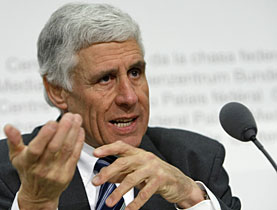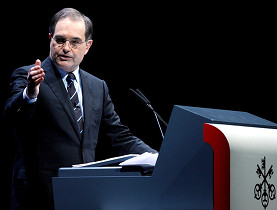“UBS could have curbed losses to $500 million”

Swiss author Myret Zaki has taken a behind-the-scenes look at the financial debacle that has shaken Switzerland's largest bank.
In an interview with swissinfo, she discusses bonuses, bailouts and how UBS could have saved itself $39.5 billion (SFr45.4 billion) in the United States subprime crisis.
UBS has suffered losses and writedowns totalling some SFr45 billion ($40 billion) over the past year because of bad investments in the subprime market and other risky financial instruments.
Earlier this month UBS asked the Swiss government for help and received a financial aid package containing a SFr6-billion loan to bolster its reserves and $54 billion to help it dispose of high-risk securities.
Zaki works as a senior financial journalist for the French-language Le Temps newspaper.
Her book – UBS: les dessous d’un scandale – has been a top-ten best seller in French-speaking Switzerland since it was published in August. A German version is due out in December and an English version is planned for January 2009.
swissinfo: What are your thoughts on the recent government bailout of UBS?
Myret Zaki: I think we’ve heard a lot of official language lately and we haven’t had much information about the true deal behind this package. We haven’t analysed enough why Switzerland has to bail out UBS, as UBS Investment Bank – the entity with the problems that has written down $40 billion – is a US bank with a US banking licence regulated by the Securities and Exchange Commission.
UBS is unique in the world as it’s not a territorial bank. It’s not like other banks in Europe or the US. We’re not really sure who should bail it out. This is a major problem and a failure for the Swiss authorities.
While the Swiss activities of UBS were very stable and safe, with its retail banking, wealth management and commercial banking, we end up here bearing the risks of US investment banking.
swissinfo: Banks like UBS are under pressure to reorganise their bonus and pay structures. What do you think might happen?
M.Z.: Politicians are now trying to calm the public who are angry. I don’t believe there will be much more than talk on the political side, but banks will all have to move towards multi-year bonus contracts. There’ll never be any more one-year bonuses.
It’s quite pessimistic, but I can’t see banks doing more than that in terms of restricting or put ceilings on bonuses. It’s a problem of global competition.
Either all banks do the same and put a ceiling, or bonus payments, which reached almost $100 million per trader at UBS during the good years from 2005-2007, are set to continue.
But for the next three or four years investment banking will be a sector where there will be no profits, so bonuses will be very much compressed, de facto.
swissinfo: What were the main reasons behind UBS’s recent collapse?
M.Z.: [Former chairman] Marcel Ospel implemented a strategy that was as ambitious as that of US banks and took the same risks, not accounting for the fact that UBS was regulated in Switzerland and had its headquarters in Zurich [and Basel].
He replaced many top Swiss managers by US people… the culture of the bank changed dramatically and they started taking the highest risks. It turns out that UBS, together with Citigroup and Merrill Lynch, was one of the biggest risk-taking banks in the US in the most speculative market, mortgage-backed securities.
I put a lot of blame on Ospel as he had disproportionate power; he reorganised the structure in the chairman’s office to give himself more power than previous chairmen.
swissinfo: Do you think UBS could have limited its losses?
M.Z.: UBS could have avoided this disaster if, during the first few weeks of February 2007, it had listened to traders at its hedge fund Dillon Read Capital Management (DRCM). This fund had been very speculative, but the traders were very professional and they saw that the market for real estate mortgage-backed securities was going down.
They signalled this to top management…but no one was sure that the market would continue to fall and in February no one believed those traders.
My sources, former DRCM people, told me that UBS could have limited its losses to $500 million if it had listened to these people and marked down its assets aggressively and sold them, getting out of the subprime market quickly. But what UBS did was to keep buying more of these papers until July 2007 and the only thing that stopped UBS was the crash of the market.
There were very highly paid people at the investment bank who had a huge specialised products operation going on and were earning so much – $50 million annually – that they could never allow anyone to withdraw this activity from them.
swissinfo: What does the future hold for UBS?
M.Z.: So far there have been three recapitalisations: by Singapore investors, UBS shareholders, and now the Swiss government and the Swiss National Bank. Each time they said it would be the last one and it turned out to be wrong.
If UBS needs more capital, which I suspect is the case, as the inter-bank market hasn’t become fluid, UBS is still in difficulty and its share price is still falling, we are going to see a dismantling of the group and a spin-off and sale of assets.
Daniel Zuberbühler, director of the Federal Banking Commission (FBC), told me that the FBC and the Swiss National Bank are convinced UBS should abandon its US activities as it’s just unbearable in terms of risk. The strategy is to move towards a sale of the investment bank.
UBS will emerge from this a different bank. The Anglo-Saxon culture of investment banking will go and it will become a more traditional, safe, successful wealth manager.
swissinfo-interview: Simon Bradley
Myret Zaki has worked as a financial journalist for the Le Temps newspaper since 2001.
Before that she was a financial analyst for the Lombard Odier bank in Geneva.
Her book, UBS: les dessous d’un scandale, has remained a top-ten best-seller in French-speaking Switzerland since it was published in August 2008.
A German version is due out in December and an English version is planned for January 2009.
UBS endured a tough 2007 and things seem to have hardly improved in 2008, mainly as a result of the US subprime mortgage crisis.
In July 2007, chief executive Peter Wuffli stepped down following the collapse of the bank’s hedge fund Dillon Read Capital Management.
In October 2007, UBS said it would cut 1,500 jobs in its investment banking arm, including that of its head Huw Jenkins. Chief financial officer, Clive Standish, left at the same time.
UBS has written down about $43 billion as a result of the subprime mortgage market collapse. Chairman Marcel Ospel stepped down in April.
The Swiss Federal Banking Commission recently reached the same conclusions as UBS as to how the downturn came about. Based on internal investigations at the bank, the commission found management lapses and “insufficient identification of pertinent risks”.
According to the office, UBS didn’t know until August 2007 the exact nature of the risks in the subprime realm. Bankers had too much confidence in risk measurement mechanisms, which, retrospectively, is “a serious lack on the part of the bank”.
UBS was this year also investigated for allegedly helping US citizens evade taxes, following a confession from a former employee. The case led to UBS stating it would stop offshore banking activities in the US.
Clients have withdrawn tens of billions of Swiss francs in assets from UBS since mid-September.
On October 16, the Swiss National Bank (SNB) agreed to put SFr6 billion ($5.29 billion) into UBS, in a move that aims to strengthen the bank’s capital base and reduce its balance sheet.
In return, Switzerland’s central bank will take a 9.3 per cent stake in UBS.
Based on an agreement with the SNB, UBS will transfer up to $60 billion of assets to a newly created fund entity and will capitalise the fund with equity of up to $6 billion.
The SNB will finance the fund with a loan of up to $54 billion, secured on the assets of the fund, taking over control and ownership of the entity.

In compliance with the JTI standards
More: SWI swissinfo.ch certified by the Journalism Trust Initiative




You can find an overview of ongoing debates with our journalists here. Please join us!
If you want to start a conversation about a topic raised in this article or want to report factual errors, email us at english@swissinfo.ch.